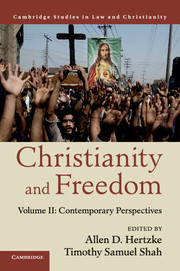Book contents
- Frontmatter
- Colophon
- Contents
- Contributing Authors
- Acknowledgments
- Introduction: Christianity and Freedom in the Contemporary World
- 1 Persecution in the Context of Religious and Christian Demography, 1970–2020
- 2 Patterns and Purposes of Contemporary Anti-Christian Persecution
- 3 Where the Spirit Leads: Global Pentecostalism and Freedom
- 4 Christianity among the Marginalized: Empowering Poor Women in India
- 5 Transnational Christian Networks for Human Dignity
- 6 The Growth and Dynamism of Chinese Christianity
- 7 Christianity and Religious Freedom in Indonesia since 1998
- 8 Christianity and Freedom in India: Colonialism, Communalism, Caste, and Violence
- 9 Vietnam: Christianity's Contributions to Freedoms and Human Flourishing in Adversity
- 10 The Challenge and Leaven of Christianity in Pakistan
- 11 Christianity and the Challenge of Religious Violence in Northern Nigeria
- 12 Copts of Egypt: Defi ance, Compliance, and Continuity
- 13 Between the Hammer and the Anvil: Indigenous Palestinian Christianity in the West Bank
- 14 Christians in the State of Israel: Between Integration and Emigration
- 15 Arab Muslim Attitudes toward Religious Minorities
- 16 They That Remain: Syrian and Iraqi Christian Communities amid the Syria Confl ict and the Rise of the Islamic State
- Index
3 - Where the Spirit Leads: Global Pentecostalism and Freedom
Published online by Cambridge University Press: 05 February 2016
- Frontmatter
- Colophon
- Contents
- Contributing Authors
- Acknowledgments
- Introduction: Christianity and Freedom in the Contemporary World
- 1 Persecution in the Context of Religious and Christian Demography, 1970–2020
- 2 Patterns and Purposes of Contemporary Anti-Christian Persecution
- 3 Where the Spirit Leads: Global Pentecostalism and Freedom
- 4 Christianity among the Marginalized: Empowering Poor Women in India
- 5 Transnational Christian Networks for Human Dignity
- 6 The Growth and Dynamism of Chinese Christianity
- 7 Christianity and Religious Freedom in Indonesia since 1998
- 8 Christianity and Freedom in India: Colonialism, Communalism, Caste, and Violence
- 9 Vietnam: Christianity's Contributions to Freedoms and Human Flourishing in Adversity
- 10 The Challenge and Leaven of Christianity in Pakistan
- 11 Christianity and the Challenge of Religious Violence in Northern Nigeria
- 12 Copts of Egypt: Defi ance, Compliance, and Continuity
- 13 Between the Hammer and the Anvil: Indigenous Palestinian Christianity in the West Bank
- 14 Christians in the State of Israel: Between Integration and Emigration
- 15 Arab Muslim Attitudes toward Religious Minorities
- 16 They That Remain: Syrian and Iraqi Christian Communities amid the Syria Confl ict and the Rise of the Islamic State
- Index
Summary
Religions that do not experience organizational, theological, and ritual renewal tend to decline, losing market share to competing religious groups that are more creative and adaptable to contemporary culture and political realities. Currently, Christianity is the world's largest religion, with approximately 2.2 billon adherents, followed by Islam with 1.6 billion, Hinduism with 1 billion, and Buddhism with fewer than a 0.5 billion. Christianity, however, would not be in this place of dominance without renewal movements throughout its history. Most recently, an example of a renewal movement is Pentecostalism, which was ignited by the Azusa Street revival in 1906 and rapidly began exporting missionaries around the world, followed by what became known as the charismatic renewal among Catholics and some mainline Protestants beginning in the 1960s.
Defining Pentecostalism is complex because of its many permutations. Theologically, Pentecostals trace their history back to the early Christian church when, fifty days after Jesus's reported resurrection, the Holy Spirit descended on his disciples and followers, enabling them to “speak in tongues” and empowering them to heal those who were sick, as well as giving them the gift of prophecy and appropriate other “gifts” of the Spirit. In the intervening two thousand years, there are various instances when ecstatic religious experiences were manifested, but the contemporary origins of Pentecostalism are typically traced to the recurrence of speaking in tongues in 1901, when students at Bethel Bible School in Topeka, Kansas, were moved by the Spirit under the tutelage of Charles F. Parham. A few years later, Parham took his message regarding Spirit baptism to Houston, Texas, where William J. Seymour, a black Holiness preacher, became convinced that the Holy Spirit was still in the business of working supernatural miracles. Seymour then began preaching the same message to a small gathering of people in 1906 in Los Angeles, igniting what became known as the Azusa Street revival, attended by thousands of people and named after the street where an interracial gathering began to replicate the acts of the first-century apostles: speaking in tongues, healing the infirm, and prophesying.
According to Allan Anderson, a simultaneous expression of the gifts of the Spirit was manifest in India (1905–1907) in the Mukti (“Salvation”) revival, led by a woman, Pandita Ramabai.
- Type
- Chapter
- Information
- Christianity and Freedom , pp. 87 - 106Publisher: Cambridge University PressPrint publication year: 2016



